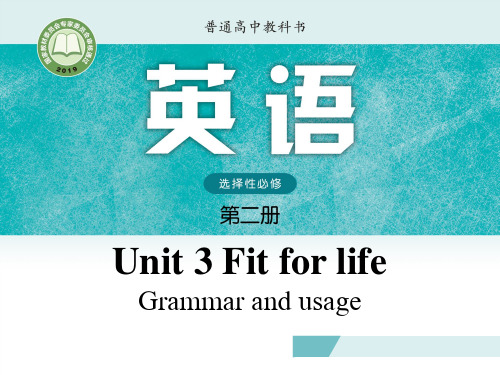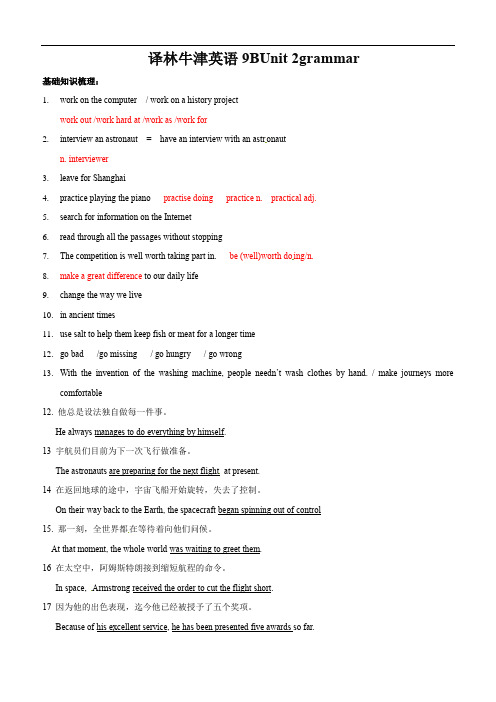牛津译林版英语九下 Unit 3 Grammar II
牛津译林版英语九下Unit 3《Robots》(Grammar)ppt精品课件

Mr Jiang’s robot
Where did Mr Jiang buy the robot? When does the robot cook breakfast? What did the robot buy at the supermarket? How does the robot wash up? Why did Mr Jiang return the robot? Who will repair the robot that went wrong?
Can anyone explain why the sun always rises in the east?
5 I want to ask Jim … What will he do at the weekend?
I want to ask Jim what he will do at the weekend.
Choose the right conj.
who else is going to be on 1. Can you tell me ______ duty?(who,what) that it wouldn’t matter much.(that, if) 2. She said ______ how he can do better.(how, who) 3. He always thinks _____ how soon the bridge will be finished. 4. I really don’t know __________ (how long, how soon) when we are going hiking. 5. They don’t know _____
4 How does the robot wash up? how the robot washes up I want to know ______________________. 5 Why did Mr Jiang return the robot? I wonder why Mr Jiang returned the robot ______________________________. 6 Who will repair the robot that went wrong? I want to ask Mr Jiang who will repair the robot that went wrong ____________________________________.
Unit3Grammarandusage教案牛津版高中英语选择性必修第二册

Unit 3 Fit for lifeGrammar and usage: Present perfect continuous tense内容分析:本板块围绕单元话题,首先通过一位佩戴机械手的残疾女孩的自述,要求学生在语篇中观察现在完成进行时的基本构成,并自主探究、归纳现在完成进行时的一般规则;随后通过句子、语篇两个层面的练习巩固所学,让学生深化理解现在完成进行时的含义和用法;最后组织学生运用所学,以角色扮演的方式运用目标语法进行采访对话,使语法知识的运用和话题相结合,实现“形式—意义—使用”三者的统一。
教学目标:By the end of this section, students will be able to:1. identify the verb form of the present perfect continuous tense;2. work out the general rules of the present perfect continuous tense;3. use the right tenses to finish related tasks;4. apply the present perfect continuous tense in new contexts.教学重难点:1.To apply the rules correctly and properly;2.Develop the thinking ability by analyzing and summarizing the grammar rules.教学过程:Step 1 Lead inT asks the Ss to read the personal account given by a girl who is equipped with a robotic hand and fill in the following table.Before having the new robotic hand•The girl began to 1. _____________ after losing her right hand in a car accident two years ago.•The old artificial hand could not help her because 2. __________With the new robotic hand•The girl can 3. _______________ and hold on to small things.•The new robotic hand is capable of 4. ________________•The new robotic hand looks very lifelike with 5. ___________Over the past three months•The girl has rediscovered old hobbies.•The girl has become more 6. _________________Possible answer1. withdraw into herself2. it didn’t feel like part of her3. move her individual fingers4. feeling varying degrees of pressure5. special rubber used on the outside6. confident and outgoingUseful expressionsbe equipped with 装备有,配备有withdraw into oneself 离群索居lead a normal life 过正常的生活hold on to 抓住不放;握住;控制More amazingly 更加令人惊异的是be capable of doing sth.有能力做某事be grateful for ... 因......而感激open up new possibilities开启新的可能性Step 2 Exploring the rulesT asks Ss go through the personal account again and fill in the box in part A on page 34.AnswerScientists have been making great progress in robotic technology in recent years, ... Over the past three months I have been testing out the limits of what I can do with my new hand, ...I have been cooking for my family again since I got my new hand.【设计意图:老师一开始通过分享一个装有义肢的女孩的生活故事,设置填空练习让学生在具体的情境中提前感知本节课的语法知识。
Unit 3 Lesson 3 Grammar and usage -牛津译林版高中英语选择性必修

Step 2 Exploring and working out the rules
Working out the rules
• We use the present perfect continuous tense to talk about an action that started in the past and is Still continuing now, or an action that has just finished but is still connected with (1)_th_e__p_r_e_se_n_t_ (the past/the present/the future) in some way.
Step 3 Applying the rules
B2 Below is an article about robotic limbs. Circle the correct expressions to complete it.
(1) has been estimated (2) have been hoping for (3) have been developing (4) have only served (5) have been doing
Unit 3 Fit foБайду номын сангаас life
Grammar and usage
Step 1 Warming up
Read part A on page 34 and answer the following questions.
1) How did the girl feel at the beginning when she was equipped with an artificial hand?
【课件】Unit3Grammar+and+usage表语从句课件牛津译林版选择性必修第三册

Practice :
①麻烦是我把他的地址(address)丢了。 The trouble is that I have lost his address.
②My suggestion is that we _s_h_o_u_l_d__te_l_l _(tell) him.
在表“建议,劝说,命令”的名词(suggestion, advice, request, demand 等)后面的表语从句中,谓语动词用“should +动词原形”(虚拟语气), should可省略
连接代词在表语从句中可充当主语、宾语、表语或定语,不能省略。
牛津译林版九年级英语下册Unit2 知识点教材全解

牛津译林版九年级英语下册Unit2 知识点教材全解【教材内容解析】ic strip&Welcome to the unit(1)Who do you think is the greatest person in history, Eddie? (P. 20)do you think在句中作插入语,意为“你认为”,它后面的部分常用陈述语序。
插入语一般是对一句话作适当的附加解释,若将其去掉,对整个句子并无多大影响。
若把插入语提到句子的前面,它就会成为主要部分,而原来的主要部分则成为一个从句。
例如:你认为她什么时候会回来?When do you think she will be back? (do you think为插入语)Do you think when she will be back? (do you think为主句)(2) I’ve never heard of him. (P. 20)hear of =hear about 听说hear from 收到……的来信Did you hear of/about Hua Chenyu from Super Boy?I hear of/about the news the day before yesterday.【拓展】①hear表示“听到、听说”,强调听的结果,listen则表示“听”,强调听的动作。
类似的还有:look“看”,see“看到”;look for“寻找”,find“找到”。
I listened carefully but I couldn’t hear what he said.②hear sb. doing sth.“听到某人正在做某事”Can you hear the girl singing in the next room?③hear sb. do sth.“听到某人做某事的全过程”Parents heard the teacher scold their son for half an hour.(3)He’s an inventor. He invented my favourite food. (P. 20)invent作动词,意为“发明、创造”,其名词形式为inventor“发明者”和invention“发明物”。
Unit 2 Grammar 基础知识及练习 2021-2022学年牛津译林版九年级英语下册

译林牛津英语9BUnit 2grammar基础知识梳理:1.work on the computer / work on a history projectwork out /work hard at /work as /work for2.interview an astronaut = have an interview with an astr onautn. interviewer3.leave for Shanghai4.practice playing the piano practise doing practice n. practical adj.5.search for information on the Internet6.read through all the passages without stopping7.The competition is well worth taking part in. be (well)worth do ing/n.8.make a great difference to our daily life9.change the way we live10.in ancient timese salt to help them keep fish or meat for a longer time12.go bad /go missing / go hungry / go wrong13.With the invention of the washing machine, people needn’t wash clothes by hand. / make journeys morecomfortable12. 他总是设法独自做每一件事。
He always manages to do everything by himself.13 宇航员们目前为下一次飞行做准备。
牛津译林版九年级下Unit3 Study skills课件(共27张PPT)
American English
/kɑr/ /təmeto/ /dæns/ /kænt/
Spelling
theatre centre colour humour
favourite jeweller (珠宝商)
traveller kilogramme
programme(节目)
theater center color humor favorite jeweler
color therter
British English and American English
Vocabulary
British
American
bookshop
bookstore
garden
yard
autumn
fall
film
movie
holiday
vacation
British English and American English
English
American English
pronunciation (发音)
Grammar (语法)
spelling vocabulary
(拼写)
(词汇)
Pronunciation
British English
car tomato dance
can’t
/kɑ:(r)/ /təmɑ:təu/ /dɑ:ns/ /kɑ:nt/
初中英语译林版九年级 Unit3 Robots
Study skills
People speak English in both Britain and the USA. However, there are some differences between their English.
UNIT3第3课时GRAMMAR(知识精讲分层练习)(教师版)九年级下学期英语讲义(牛津译林版)
Unit 3 Robots 课时 3 Grammar影目标导航重点词组」I. own a robot 2.consider the robot a great help in my daily life 3.go on a business trip4. have a serious heart problem5.have to take medicine every day6.have a poor memory7.remind you to take pills at the right time8.feel lonely9.lock the door lO.Go up and down thestairs o 11 ,have a better sleep 重点句型1. He saw that the robot was making breakfast. He saw the robot making breakfast.2. He (bund that his flat was in a complete mess.He found his flat in a complete mess.3. The robot no longer knew when it should cook breakfast.The robot no longer knew when to cook breakfast.4. Mr Jiang did not know what he should do with the robot.Mr Jiang did not know what to do with the robot.5. Mr Jiang is always so busy that he does not have any time for hobbies. Mr john is always too busy to have any time tbr hobbies.6. The robot is so smart that it can do a lot of things. The robot is smart enough to do a lot of things.7. Mr Jiang plans to buy a robot so that he can have more free time.Mr Jiang plans to buy a robot in order to have more free (ime<>♦知识点睛©consider ...as 把…看做 常用被动结构be considered as...? “被认为/看做”?Purple is considered as the noblest color.紫色被认为是最高贵的颜色。
Unit3Grammar课件牛津译林版九年级英语下册(1)
We can use objects + object complements to replace object clauses.
Work out the rule
1. 含有that引导的宾语从句(that可省略),可以用复合宾语,即“主语+谓语+宾 语+宾补”这种结构语改写。
4. What did he think of the robot a few weeks later He thought it was too much trouble to own a robot.
Observe and learn
1. He saw that the robot was making breakfast. 2. He found his flat was in a complete mess. 3. He thought that it was helpful to do the housework. 4. He thought it was too much trouble to own a robot.
3. To learn to use object clauses or objects + object complements;
4. To learn to use adverbial clauses or to-infinitives.
Look and answer
1. What did Mr Jiang see when he got up in the morning He saw that the robot was making breakfast.
译林版高中英语必修3讲义Unit 2 Section Ⅲ Grammar——名词性从句(Ⅱ)与it作形式主语
Section ⅢGrammar——名词性从句(Ⅱ)与it作形式主语语境自主领悟先观察原句①That is why English has so many difficult rules that confuse people.②It is interesting to learn how the words for animals and meat developed.③It is certain that this process will continue...④I always wondered when I would get the English novel my parents had promised to give me.⑤What I always dreamt of has come true.⑥It is fun wandering in the countryside.后自主感悟1.第①、④、⑤句中的黑体部分都是名词性从句,它们分别在各自的句子中作表语、宾语和主语。
2.第②、③、⑥句中的黑体部分都是it作形式主语的用法,it分别替代的是动词不定式、主语从句和动名词短语。
一、连接代词、连接副词引导的名词性从句1.由what,which,who/whom,whose等连接代词和when,where,why,how等连接副词引导的名词性从句在句子中可以充当主语、宾语、表语或同位语。
(1)主语从句What surprised us was her ignorance.使我们吃惊的是她的无知。
Where we will go hasn't been decided.我们要去哪儿还没有定下来。
When she will come is still unknown.她何时来还不知道。
(2)宾语从句The school was built on what used to be a wasteland.这所学校是在以前的荒地上建造的。
- 1、下载文档前请自行甄别文档内容的完整性,平台不提供额外的编辑、内容补充、找答案等附加服务。
- 2、"仅部分预览"的文档,不可在线预览部分如存在完整性等问题,可反馈申请退款(可完整预览的文档不适用该条件!)。
- 3、如文档侵犯您的权益,请联系客服反馈,我们会尽快为您处理(人工客服工作时间:9:00-18:30)。
madeofdingshangtuwen 九下 Unit 3 Grammar II班级_______ 学号_______ 姓名__________一、根据要求写单词。
A )根据中文提示完成句子。
1. I’m busy. Could you (邮寄) the letter for me?2. I don’t think the robots will have_______ (大脑) in the future.3. You’d better not ask too many _______ (私人的) problems at the party.4. It seemed that these robots _____ (满足) many people’s needs.5. The students were (不确定的) when Mr. Wu came here.6. Are there any ___________(硬币) in the box?7. In fact, the ______________(机器人)two big eyes are used to take photos.8. His robot can’t work ____________ (适当地). It doesn’t talk.9. Many countries are taking action to _____________(探索) space.10. If the robot catches __________(病毒), it will cause a lot of problems.B )用括号里所给单词的适当形式填空。
1. Tom (order )a home robot from the robot shop yesterday.2. Look out! The car is _____________(complete) out of control.3. The customer wrote a __________ (complain) letter to the manager.4. My grandmother is 92 and has become very (forget) and confused.5. The kind of virus ______________ (spread) quickly in the past several months.二、单项选择。
( )1. You don’t have to do the cooking by yourself. You can _____ your robot cook meals for you.A. askB. teachC. tellD. have( )2. We didn’t know how to find them because they didn’t tell us _______.A. which room did they liveB. which room they lived inC. which room they livedD. which room did they live in( )3. The robot needs _______ once a month. And we will check it for you for free.A. to checkB. checkedC. checkingD. to checking( )4. —Jack, I have________ working out the math problem.—Don’t worry. Let me help you.A.funB. troubleC. experienceD. interest( )5. —________terrible mess you have made! — Sorry. I will clear it up right now.A. WhatB. HowC. How aD. What a( )6. — I am having some problems with my 15-year-old son. It seems that he says no to _______Isay.— I think you two should have more communication.A. howeverB. whateverC. whereverD. anyway( )7. — I can’t decide_______to do with so many old clothes.— Why not send them to a charity?A. whyB. whatC. whoD. where( )8. I agreed on her suggestion_________let her down, though I thought mine was better.A. in order don’tB. in order not toC. not in order toD. in order that not( )9. The new method works very well. So far, everything has been going on________that we don’t need to worry.A. too completelyB. so completelyC. too smoothlyD. so smoothly( )10. Mr. Robinson is a careful detective. No detail is ________escape his attention.A. too small toB. so small thatC. as small asD. not small enough【能力提高】一、完型填空。
In some science fiction movies ,the robots are just like humans. They help with the housework and do the most 1 jobs.Some scientists believe that there will be such robots in the future. 2 ,they agree it may 3 hundreds of years. Scientists are now trying to make robots 4 people and do the same things as us.But robot scientist James White 5 . He thinks that it will be 6 for a robot to do the same things as a person. 7 ,it’s easy for a child to wake up and know where they are. Mr. White thinks that robots won’t 初三英语作业纸 九年级be able to do this. But other scientists disagree. They think that robots will be able to talk to people 8 25 to 50 years.Robot scientists are not just trying to make robots look like people. For example,there are already robots 9 in factories. They do simple jobs over and over again. People would not like to do such jobs and would get bored. But robots will 10 get bored.In the future,there will be more robots everywhere,and humans will have 11 work to do. New robots will have many different 12 . Some will look like humans, and 13 might look like snakes. After an earthquake(地震),a snake robot could help look for people under buildings. That may not seem possible now,but computers,space rockets and even electric toothbrushes 14 impossible a hundred years ago. We never know 15 will happen in the future!( )1. A. interesting B. unpleasant C. pleasant D. popular( )2. A. But B. So C. However D. While( )3. A. use B. spend C. pay D. take( )4. A. look like B. look at C. look for D. look up( )5. A. agrees B. disagrees C. likes D. dislikes( )6. A. easy B. difficult C. important D. possible( )7. A. For example B. Instead C. Such as D. Besides( )8. A. after B. for C. over D. in( )9. A. worked B. work C. working D. to work( )10. A. always B. easily C. never D. often( )11. A. more B. less C. fewer D. little( )12. A. shapes B. colors C. sizes D. actions( )13. A. the other B. other C. the others D. others( )14. A. seem B. seemed C. got D. look( )15. A. that B. how C. what D. when二、阅读理解。
